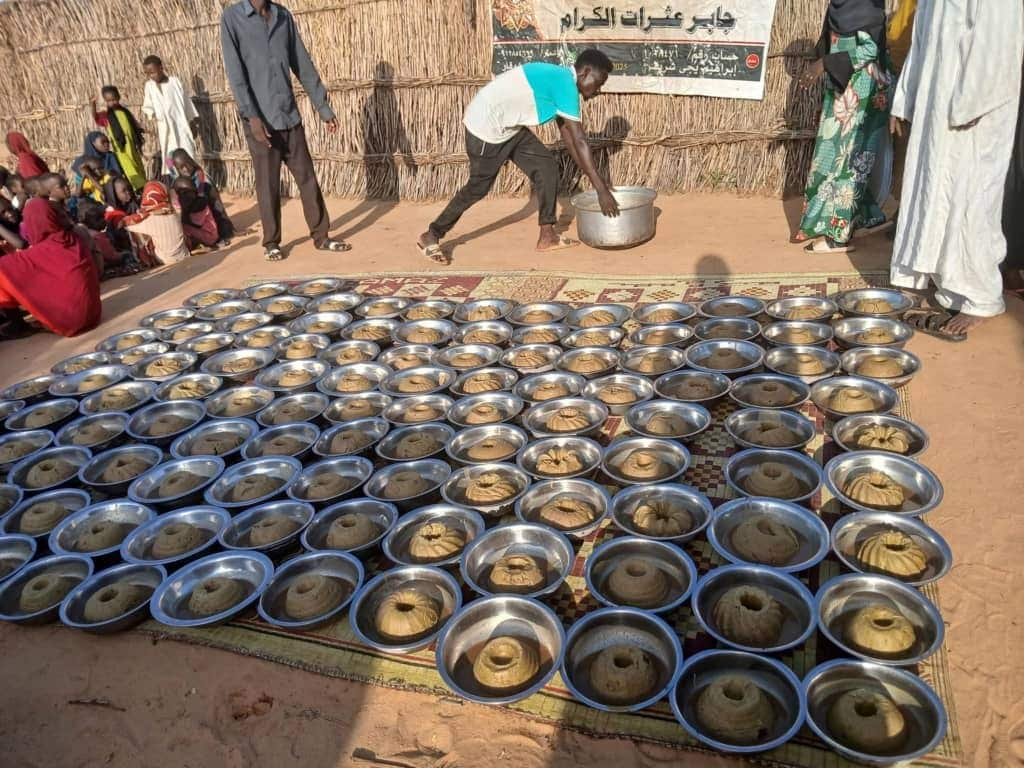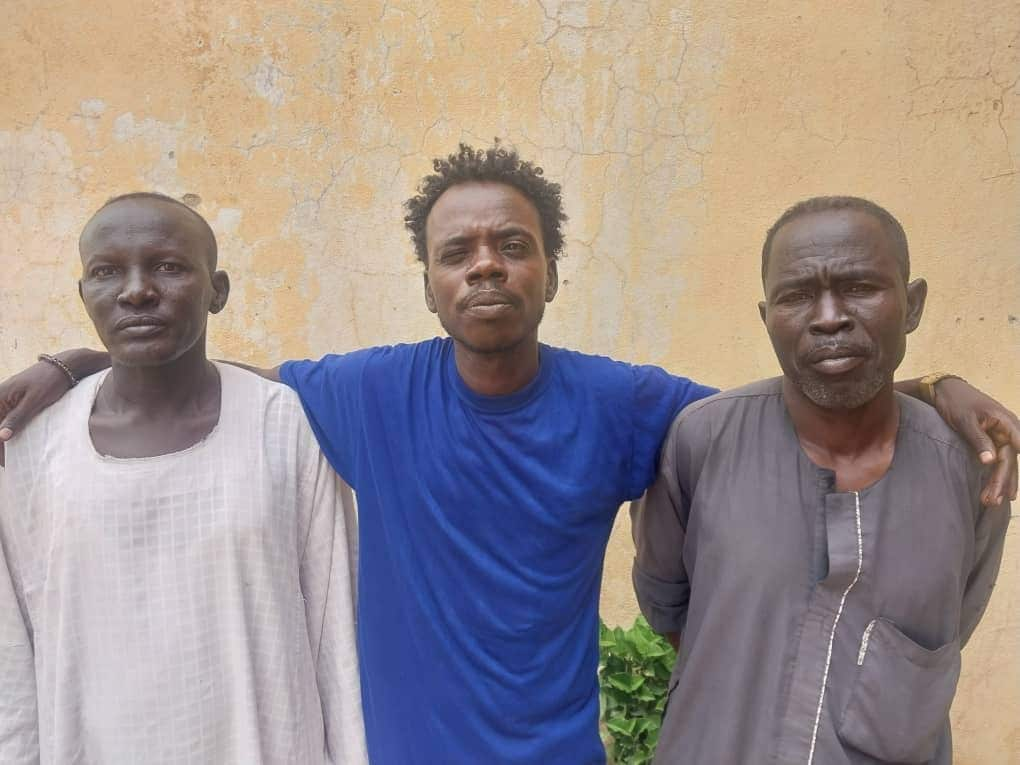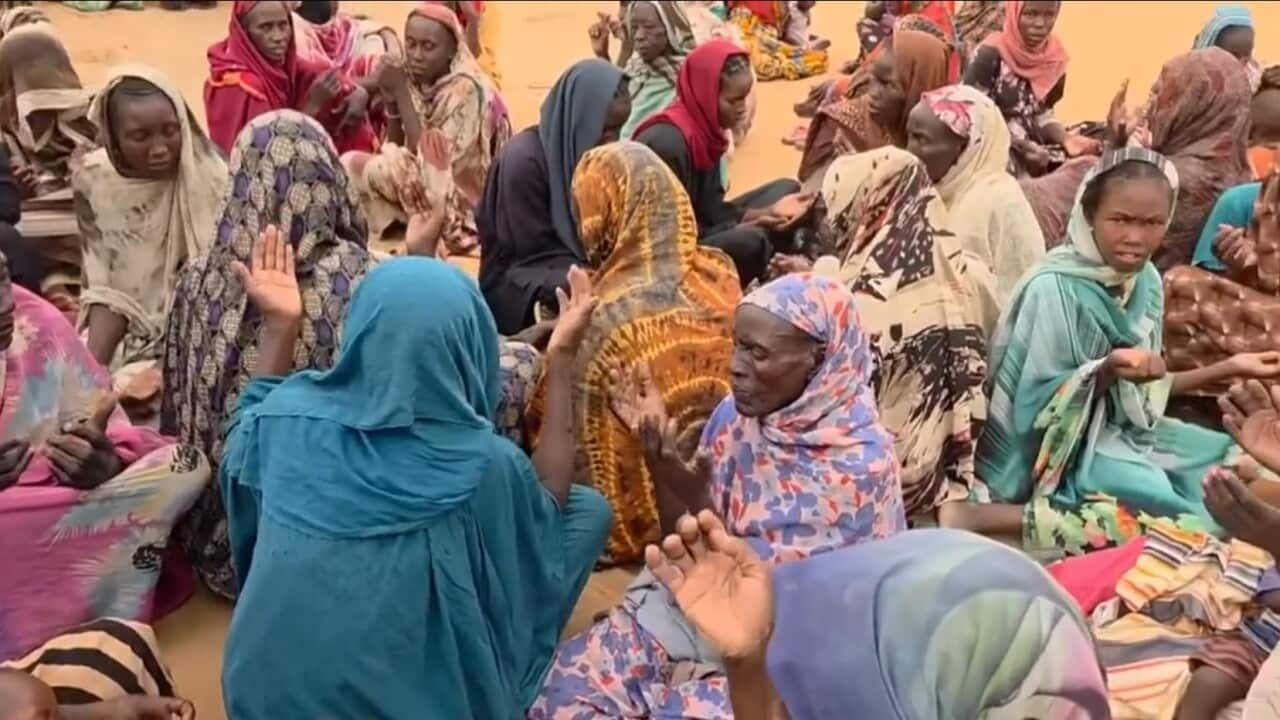In the Sudanese city of al-Fashir, women sing prayers, begging for food.
The city has been cut off from the world by the paramilitary Rapid Support Forces (RSF) for more than 15 months.
No food or aid delivery has been allowed in.
Now, civilians worry the only thing that awaits them is death.
"If you don't rescue us, I swear by God, no treatment or hospitals are available, only death," a woman trapped in the besieged city told SBS News.
"We have nothing left for us but death."
'They're dying daily'
Hundreds of thousands of people are under siege in al-Fashir, the Sudanese army's last holdout in the western Darfur region.
People are running out of food and coming under constant artillery and drone barrages, while those who flee violent attacks and a cholera outbreak in surrounding areas.
The city is the biggest remaining frontline in the region between Sudan's army and the RSF, under fire at a pivotal point in a civil war now well into its third year.
But the RSF has blocked food supplies and sources speaking to Reuters have said aid convoys trying to reach the city have been attacked. Prices for the goods that traders are able to smuggle in cost more than five times the national average.
Now, residents are facing famine.
Mohamed Dodah, a refugee and Zaghawa community leader, fled to the besieged city as it was the last city in Darfur not under RSF control.
Dodah said people eat one meal a day — if that — and said he's surrounded by starvation and death.
"If you could eat breakfast, you'll wait for the next day to eat another meal," Dodah told SBS News. "They're suffering right now. They're dying daily."
What food civilians can get is poor. Some eat hay. Ambaz — peanut oil waste, which is typically used to feed animals — is reportedly now the primary source of food. But there are fears that even that is running out.

Farhan Haq, deputy spokesperson for the United Nations' secretary-general, said civilians in al-Fashir are at a breaking point. "Local sources say people are dying from hunger and malnutrition," Haq told SBS News.
"Community-run kitchens have shut down due to a lack of food stocks, and some residents have reportedly resorted to consuming animal feed."
The UN says half of Sudan's 50 million population is facing acute hunger after more than two years of civil war between RSF militants and the Sudanese army.
In Darfur, the UN has declared famine in 11 locations.
UNICEF estimates more than 330,000 people are facing malnutrition in the city of al-Fashir alone due to a total blockade of aid by RSF militants.
It's becoming an increasingly impossible situation for civilians, who also struggle with shellings and increasingly more dangerous weather conditions.
"One and a half million civilians are suffering from the ravages of artillery and drone shelling, as well as shrapnel from the fighting on the outskirts of the city," Dodah said.
One civilian said the citizens are "suffering extremely harshly", especially in harsh weather conditions. Temperatures are hitting 35 degrees, while rain and storms bombard the city.
"These houses do not provide shelter or cover," she said. "These children are not eating. Even the main meal is not available."
What is happening in al-Fashir?
Al-Fashir has been cut off from the world by the RSF for more than 15 months.
The civil war between the Sudanese army and the RSF erupted in April 2023 when the former allies clashed over plans to integrate their forces.
The RSF made quick gains in central Sudan, including the capital Khartoum, but the army pushed them westward this year, leading to an intensification in fighting in al-Fashir.
The city's fall would give the RSF control over nearly all of Darfur — a vast region bordering Libya, Chad, the Central African Republic and South Sudan — and pave the way for what analysts say could be Sudan's de facto division.
Besieged along with the army and its allies are hundreds of thousands of al-Fashir's residents and people displaced by previous attacks, many living in camps that monitors say are already in famine.
As a child, Dodah's village was destroyed by Arab militias who targeted his tribe, the Zaghawa people, along with the Masalit and Fur tribes.
These militias later became the RSF.
In April, the RSF raided Dodah's home in the Zamzam displacement camp, where he alleged they set fire to the camp and even killed foreign aid workers.
"The entire Relief International staff had been wiped out, including the camp director and nine other employees. I found their bodies stacked, each with a bullet wound to the head," he said.

Reports on the attack suggested up to 400 non-Arab civilians were killed during the three-day assault. The UN said "hundreds" of civilians, including 12 humanitarian workers, were killed.
But a new Guardian investigation estimates the real number of civilians killed sits at 1,500, with repeated testimony of mass executions and large-scale abductions.
That number could be even higher with many bodies still not recovered from the camp, now controlled by the RSF.
Dodah fled to the last city in Darfur, not under RSF control — al-Fashir. Now, he believes he will be killed — or at least held hostage — if the city falls.
"If they control al-Fashir, there will be killing and raping and kidnapping. Firstly, they will kill the leaders. They will catch me, [they will] put me in a prison — if not kill me," he said.
No escape
Sudanese-Australian man Algaly Abdelrasoul lives in Sydney, but his uncle, aunt and extended family are trapped in al-Fashir.
He's only able to get through to his uncle on occasion, hearing glimpses of the violence.
"So basically, he says this [person's] doing well. This one has passed away. This one's wounded. This one is gone somewhere. This one we haven't spoken to, we don't know where they are," Abdelrasoul told SBS News.
"This is the norm. I say tell me more. What is happening? How are you feeling? He just tells me, we just survived another day. He sees it as, I just need to survive."
When asked if it's possible for his uncle to escape the starving city, which is surrounded by the RSF, Abdelrasoul said there's no safe way out of al-Fashir.
"Men — you can't [escape]. Women and kids, [you might] if they show mercy, and that's a risk — you might try to escape and they might kill you. They might rape you," he said.
"If they feel like letting you go — if you're lucky enough — you might be able to escape to a surrounding town.
"It's a very delicate situation. Because if you stay there, if you're not being killed by the RSF, then you're dying of hunger, starvation, lack of medical assistance is also a big issue.
"They're just holding on for dear life."
'We are watching al-Fashir be murdered'
Nathan Raymond, a human rights investigator who leads the Yale Humanitarian Research Lab, has worked with the UN to better understand the hunger crisis.
He said while the people in Gaza have had aid deliveries severely limited for several months now, in al-Fashir, it's been over a year of total blockade.
"In the case of al-Fashir, they have been in a state of humanitarian siege now since the spring of 2024 — so over a year," Raymond told SBS News.
"The famine review committee of the United Nations declared an IPC five event, which is the highest degree of famine."
While both the military and the RSF have been accused of war crimes in the current conflict, several human rights groups, as well as the United States, say the paramilitary group has committed genocide in Darfur — a claim the militia denies. The RSF also denies committing genocide, saying it was not involved in what it describes as a "tribal conflict" in Darfur.
Raymond's team at Yale have monitored alleged war crimes in Darfur using ultra-high resolution satellites and sensors provided by NASA and the European Space Agency.
"It's very easy to make assessments due to the remote sensing data. We monitor cemeteries at al-Fashir and over the past year, those cemeteries have been growing exponentially," Raymond said.
"We can watch them bury their loved ones from space."
He said the satellites have picked up damage to feeding centres, hospitals, mosques and other critical humanitarian infrastructure.
"We are watching al-Fashir be murdered from 450 miles above the Earth's surface," he said.
But the Sudanese Armed Forces (SAF) and the civilians within the city may not be able to hold out for much longer.
"At this point, it's a matter of time unless there's a major change in SAF's military strength
"Most of the city has been reduced to rubble.
"By our calculations, more than 40 per cent of the city has been destroyed by RSF bombardment and attacks and Sudan Armed Forces airstrikes and artillery bombardment to try to target the Rapid Support Forces.
"The civilians have been caught in the crossfire at this point. There is no food in the city."
— With additional reporting by Reuters
For the latest from SBS News, download our app and subscribe to our newsletter.

